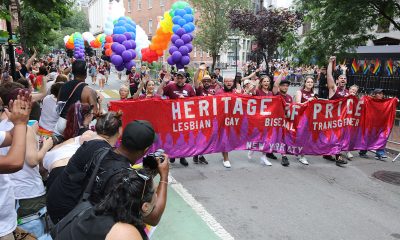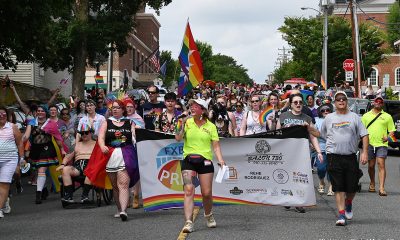Theater
Theater: Stories and stages
A Sondheim classic, ‘Dolly’ re-working and gay actors galore
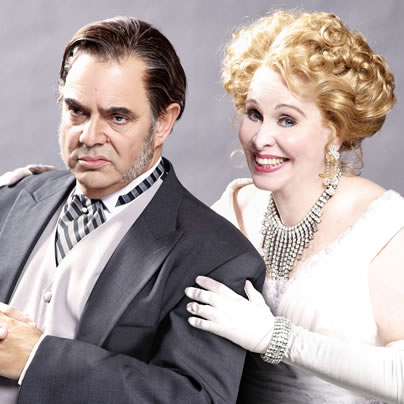
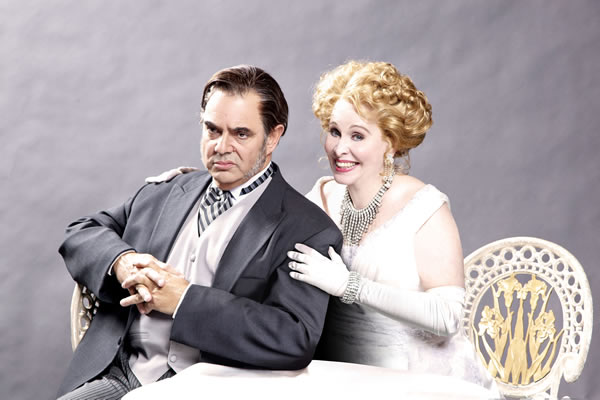
Edward Gero and Nancy Opel in Ford Theatre’s upcoming production of ‘Hello Dolly.’ (Photo by Scott Suchman; courtesy Ford’s)
For local LGBT theatergoers, the spring season promises a wide selection of both fresh and familiar offerings, some light and others more compelling.
At Arena Stage, Robert O’Hara is directing “The Mountaintop” (March 29-May12), playwright Katori Hall’s “bold reimagining of the last night of the historic life of Dr. Martin Luther King.” Talented, multifaceted and gay, O’Hara is currently playwright in residence at Woolly Mammoth Theatre.
Arena (arenastage.org) is also mounting gay playwright Jon Robin Baitz’s newest play “Other Desert Cities” (April 26-May 26). While spending Christmas at the beige Palm Springs home of her aging Reaganite power couple parents, fragile adult daughter Brooke drops a bomb — she’s writing a tell-all memoir. Complications ensue. The New York Times’ Ben Brantley compared “Other Desert Cities” to sophisticated plays from the past. It’s like those “literate, thoughtful, well-tailored topical dramas in which people spoke with a fluency, wittiness and sense of timing we only wished we could command in real life.”
This spring will age MaryBeth Wise far beyond her years. She’s cast to play Mary in Round House Theatre’s (roundhousetheatre.org) production of “How to Write a New Book for the Bible” (April 10-May 5), playwright Bill Cain’s autobiographical work about a man who returns home to care for his dying mother. “It’s kind of a memory play,” says Wise, who is gay. “My part requires going from age 40 to 80, and back and forth.” She predicts a “funny and intense journey.” Ryan Rilette is directing.
Triple threat Bobby Smith will be spending a lot of time at Arlington’s Signature Theatre (signature-theatre.org) in the coming months. First, Smith (who is gay) plays Peter, a possibly gay man living happily with ex-wife Susan in Eric Schaeffer’s production of Stephen Sondheim’s “Company” (May 21-June 30), the award-winning musical about a marriage-phobic bachelor’s search for meaning. The show’s spectacular score includes “Being Alive,” “Side By Side,” “Little Things You Do Together,” “Another Hundred People” and “Ladies Who Lunch.”
And this summer, Smith is evil Richard Riddle in Signature’s “Spin,” a world premiere musical based on a Korean cult classic titled “Speedy Scandal.” Smith describes his character as a sort of Rex Reed-style gossip columnist villain.
At MetroStage (metrostage.org) in Alexandria, John Vreeke is directing “Ghost Writer” (April 25-June 2). When a famed novelist drops dead mid-sentence, his typist, Myra (Susan Lynskey), continues writing his unfinished book as if taking dictation from the great beyond. MetroStage’s artistic director Carolyn Griffin says Vreeke, who is gay, is brilliant at finding “the perfect tone and balance for gemlike plays with delicate scripts in which very special relationships are portrayed.”
At Folger Theatre on Capitol Hill (folger.edu), prolific gay set designer Tony Cisek is again collaborating with British director Robert Richmond — this time on Shakespeare’s gender bending comedy “Twelfth Night” (April 30-June 9). The cast features local favorites including Joshua Morgan (also gay) as Valentine, the gentleman attendant to Duke Orsino.
In Tysons Corner, 1st Stage (1ststagespringhill.org) is presenting gay playwright John Logan’s “Never the Sinner” (March 22-April 14), an erotically fraught telling of the real life Leopold and Loeb case in which a pair of affluent Chicago teenagers attempt to commit the perfect murder. The talented Jeremy Skidmore directs.
As part of the Kennedy Center’s Nordic Cool 2013 (a month-long celebration of Scandinavian culture), Stockholm’s Royal Dramatic Theatre is presenting the U.S. premiere of “Fanny and Alexander” (March 7-9), its much ballyhooed stage adaptation of Ingmar Bergman’s beautiful Oscar-winning feature film.
Also coming to the Kennedy Center: “The Guardsman” (May 25-June 23), a revival of the 1920s Broadway comedy hit that starred the famed married acting team Alfred Lunt and Lynn Fontanne as game-playing newlywed actors. Known for years as the first family of the American theater, Lunt and Fontanne, both gay, were married primarily for reasons of business and friendship. (kennedy-center.org)
On the Ides of March, Ford’s Theatre (in co-production with Signature) is rolling out that musical comedy chestnut “Hello Dolly!” (March 15-May 18) (fordstheatre.org). Based on gay playwright Thornton Wilder’s comedy “The Matchmaker,” the 1964 fun musical boasts a memorable score by gay composer Jerry Herman that includes enduring tunes like “Before the Parade Passes By,” and, of course, “Hello, Dolly!” The title role — most notably performed by Carol Channing in New York and on tour for what seems several centuries, and Barbra Streisand on the silver screen — will be played by Broadway veteran Nancy Opel. Terrific local actor Edward Gero is cast as Dolly’s grumpy romantic quarry Horace Vandergelder. Signature’s gay artistic director Eric Schaeffer is directing.
Philip Fletcher is taking on the lead role of the wronged Prospero in Synetic Theater’s (synetictheater.org) “The Tempest” (through March 24), the ninth installment of the fabulously innovative movement based company’s “Silent Shakespeare” series. Fletcher, who’s gay, won a Helen Hayes Award for his outstanding supporting actor effort as one of three witches in Synetic’s “Macbeth.”
Olney Theatre Center (olneytheatre.org) is mounting Jeff Talbott’s racially charged comedy “The Submission” (May 9-June 9). Here’s the premise: Using the pen name Shaleeha G’ntamobi, a nascent gay white playwright writes a about a black family dealing with ghetto life. When his play is selected to be produced by a prestigious theater festival, the playwright hires a black actress to stand in for him. Guess what? Things don’t go smoothly.
Theater
Stephen Mark Lukas makes sublime turn in ‘Funny Girl’
Updated take at Kennedy Center features fabulous score
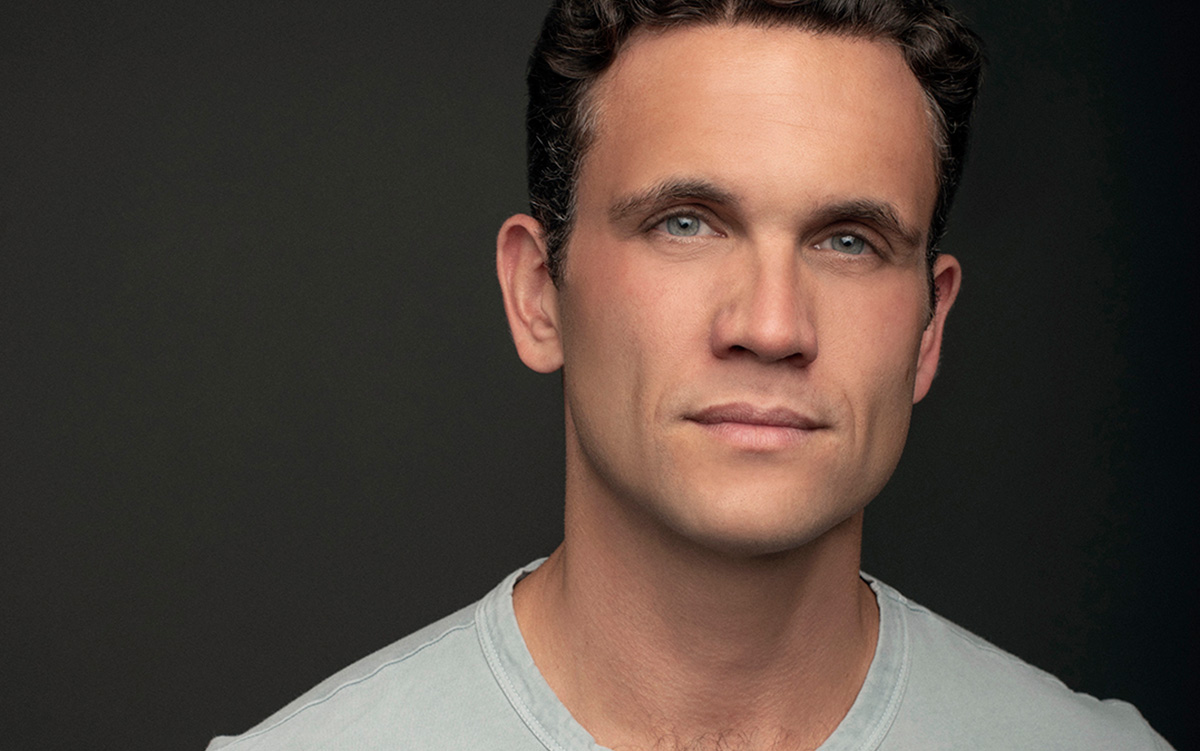
‘Funny Girl’
Through July 14
The Kennedy Center
$49-$189
Kennedy-center.org
With his striking good looks and sublime singing voice, out actor Stephen Mark Lucas is the ideal musical theater leading man, a title he both nails and thoroughly enjoys.
He’s played Elder Price in “The Book of Mormon” both on Broadway and on tour, and regionally, he’s wowed audiences performing classic parts like Sky Masterson in “Guys and Dolls,” Joe Hardy in “Damn Yankees,” Lancelot in “Camelot,” and Curly in “Oklahoma.”
He’s now playing Nick Arnstein, the love interest of Katerina McCrimmon’s Fanny Brice in the national tour of the Broadway revival of “Funny Girl.” Composed by Jule Styne and Bob Merrill, it’s the musical story of comedian Brice’s rise from anonymity to stardom via vaudeville, Ziegfeld Follies, radio, and some film. While cementing the Brice legend, the show also became inextricably linked to Barbra Streisand through the 1964 Broadway hit and later movie musical that made her a star.
When we meet Arnstein, a suave, mustachioed gambler, he seems on top of the world, but that soon proves otherwise. Lukas says, “He serves as a bit of an antagonist, but his shortcomings are what pave the way for Fanny’s triumphant ending.”
Certainly, the show still features fabulous tuneful hits like “Don’t Rain On My Parade,” “I’m the Greatest Star,” and “People.” But now there’s an updated book from Harvey Fierstein based on the original classic by Isobel Lennart, which strives to make Arnstein a little more likeable, he says.
Lukas, who understudied Ramin Karimloo as Nick while on Broadway before taking the part on tour, says, “My character exists in relation to Fanny. The musical is her memories. So, the way I do the role has a lot to do with the actor who’s playing Fanny. So far there have been six including the well-received Lea Michele.”
The quality of Fanny’s ambition is stronger in the first act while the second act spotlights the demise of her romantic life with Nick, something audiences don’t always anticipate, says Lukas.
He says McCrimmon captures the blind ambition of the younger Fanny, adding, “her voice is out of this world. People aren’t prepared for what she brings to the part vocally. She’s young yet possesses an old Hollywood quality, and she gets the humor of the role. My favorite song is a duet added to the second act. It’s really beautiful.”
Lukas says he’s never had a problem playing straight romantic characters, explaining that his acting takes care of that.
He has noticed that over the years the business has changed from more of a “don’t ask don’t tell” policy to something freer: “When I started in the profession, it was a different time. The public perception of queerness for actors has changed.”
For instance, Lukas is very open about his longtime relationship with former Broadway dancer Brian Letendre – the pair are slated to tie the knot after the “Funny Girl” tour ends.
Most of his roles have dealt with masculinity in some way, says Lukas. “A lot of characters I play start with confidence and unravel as the show goes on. What does it mean to be a man? What is masculinity? What does it mean to be a husband and a father?”
Growing up in Kennebunkport, Maine, he enjoyed annual visits to New York to see Broadway shows. He boarded at the prestigious Phillips Exeter Academy in New Hampshire, and studied theater at NYU. He’s remained based in New York City thereafter.
His life on the road is enjoyable yet disciplined. Lukas says, “the spaces where we perform are interesting for this show in particular. ‘Funny Girl’ is in many ways a show about theater, and we play some of the old vaudeville theaters and movie palaces where Fanny Brice in fact performed.”
While moving from town to town, Lukas takes care of his voice. He makes sure to eat and sleep well, and works out regularly as evidenced by his impressive build. He also prioritizes visits with his partner whenever possible.
“These older book musicals are character driven and have great scores,” says Lukas. “It’s what makes them relevant today. On the surface they might feel dated, but there’s also the contemporary humor and romance.”
What’s more, the work is never stagnant, he adds.
“Increasingly, I approach the work as an actor first and that’s what informs the singing; it’s that intersection that goes from scene into song, and that makes a difference.”
Theater
Sophie Zmorrod embracing life on the road in ‘Kite Runner’
First national tour comes to Eisenhower Theater on June 25

‘The Kite Runner’
June 25 – 30
The Kennedy Center
$39-$149
Kennedy-center.org
Newly single, Sophie Zmorrod is enjoying life on the road in the first national tour of “The Kite Runner,” Matthew Spangler’s play with music based on Khaled Hosseini’s gripping novel about damaged relationships and longed for redemption.
“It’s a wonderful time for me,” says Zmorrod. “I’m past the breakup pain and feeling empowered to explore new cities. A lot of us in the cast are queer, so we figure out the scene wherever the show goes.”
What’s more, the New York-based actor has fallen in love with the work. “I love how the play’s central character Amir is flawed. He is our antihero. He has faults. As a privileged boy in Kabul, he bears witness to his best friend’s assault and doesn’t intervene. He lives with that guilt for decades and gets that redemption in the end.”
“He does what he can to right wrongs. For me who’s regretted things, and wished I could go back in time, it resonates. Watching someone forgive themselves and do the right thing is beautiful.”
Via phone from Chicago (the tour’s stop before moving on to Kennedy Center Eisenhower Theater on June 25), Zmorrod, whose background is Lebanese, happily chats about sexuality, ethnicity, and acting.
WASHINGTON BLADE: Looking at your resume, I see you’ve been cast in roles traditionally played by men. And have you played queer characters?
SOPHIE ZMORROD: Oh yes, both. Whether or not they’re written on the page as queer, they sometimes turn out that way. And that holds true for this show too.
With “The Winter’s Tale” at Trinity Rep, I played Leontes — the king who banishes his wife — as a woman. So, in that production it was about two women and touched on the violence that women sometimes inflict on other women.
And there was Beadle Bamford in Sondheim’s “Sweeney Todd” also at Trinity Rep; I played him as a woman who was masculine and wore a suit. It was a great opportunity to explore myself and gender expression. That was a really good experience.
BLADE: Are you an actor who’s often be called in for queer roles?
ZMORROD: Not really. I’m what you might call straight passing. Sometimes I’ve had to advocate for my queerness. To be a part of something.
Similarly with my ethnicity. I’m called in to audition for the white and Arab roles. It gets tricky because I’m not the exactly the white girl next door and I’m not exactly Jasmine from Disney’s “Aladdin” either.
This is one of the reasons, I really want people to come see “The Kite Runner,” Audiences need to experience the reality of the wide diversity of Middle Eastern people on the stage. We’re all very different.
And not incidentally, from this 14-person cast, I’ve met some great people to add to those I know from the Middle Eastern affinity spaces and groups I’m connected to in New York.
BLADE: In “The Kite Runner” what parts do you play?
ZMORROD: Three characters. All women, I think. In the first act, I’m an elderly eccentric pomegranate seller in the Afghan market, waddling around, speaking in Dari [the lingua franca of Afghanistan]; and the second act, I’m young hip and sell records in a San Francisco market; and at the end, I’m a buttoned-down American immigration bureaucrat advising Amir about adoption.
BLADE: Your training is impressive: BA cum laude in music from Columbia University, an MFA in acting from Brown University/Trinity Repertory Company, and you’re also accomplished in opera and playwrighting, to name a few things. Does “The Kite Runner” allow you to flex your many muscles?
ZMORROD: Very much. Playing multiple roles is always fun for an actor – we like malleability. Also, there are instruments on stage. I like working with the singing bowl; it’s usually used in yoga as a soothing sound, but here we save it for the dramatic, uncomfortable moments. I also sing from offstage.
We are creating the world of the play on a very minimal set. Oh, and we do kite flying. So yeah, lots of challenges. It’s great.
BLADE: It sounds like you’re in a good place both professionally and personally.
ZMORROD: It’s taken a long time to feel comfortable. But I’m on the journey and excited to be where I am, and who I am.
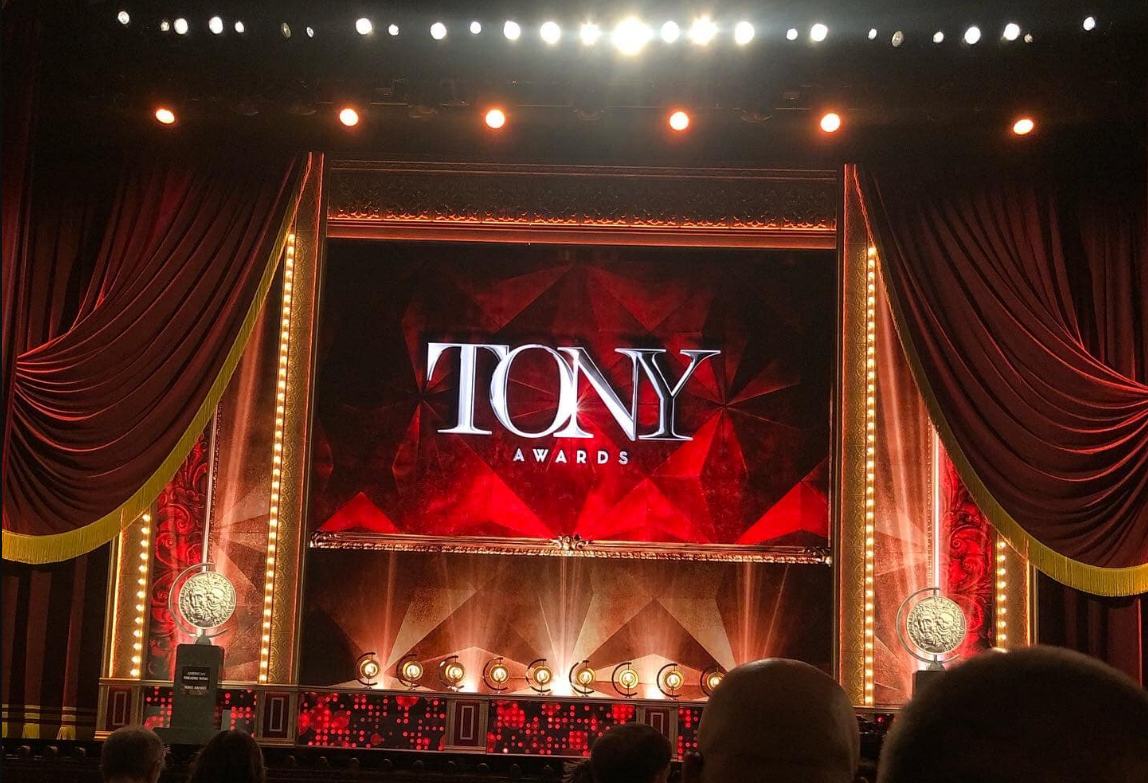
It was a banner night for queer theater artists at the 77th annual Tony Awards, honoring the best in Broadway theater at the Lincoln Center in New York on Sunday. Some of the biggest honors of the night went to the revival of the Stephen Sondheim musical “Merrily We Roll Along” and the dance-musical based on Sufjan Stephens’ album “Illinoise.“
“Merrily We Roll Along,” which follows three friends as their lives change over the course of 20 years, told in reverse chronological order, picked up the awards for Best Revival of a Musical and Best Orchestrations.
Out actor Jonathan Groff picked up his first Tony Award for his leading role as Franklin Shepard in the show, while his costar Daniel Radcliffe earned his first Tony Award for featured performance as Charley Kringas.
Groff gave a heartfelt and teary acceptance speech about how he used to watch the Tony Awards as a child in Lancaster County, Pa.
“Thank you for letting me dress up like Mary Poppins when I was three,” he said to his parents in the audience. “Even if they didn’t understand me, my family knew the life-saving power of fanning the flame of a young person’s passions without judgment.”
Groff also thanked the everyone in the production of “Spring Awakening,” where he made his Broadway debut in 2006, for inspiring him to come out at the age of 23.
“To actually be able to be a part of making theatre in this city, and just as much to be able to watch the work of this incredible community has been the greatest pleasure of my life,” he said.
This was Groff’s third Tony nomination, having been previously nominated for his leading role in “Spring Awakening” and for his featured performance as King George III in “Hamilton.”
Radcliffe, who is best known for starring in the “Harry Potter” series of movies, has long been an ally of the LGBTQ community, and has recently been known to spar with “Harry Potter” creator JK Rowling over her extreme opposition to trans rights on social media and in interviews. It was Radcliffe’s first Tony nomination and win.
Lesbian icon Sarah Paulson won her first Tony Award for her starring role in the play “Appropriate,” about a family coming to terms with the legacy of their slave-owning ancestors as they attempt to sell their late father’s estate. It was her first nomination and win.
In her acceptance speech, she thanked her partner Holland Taylor “for loving me.” Along with Paulson’s Emmy win for “American Crime Story: The People vs. O.J. Simpson,” she is halfway to EGOT status.
The Sufjan Stephens dance-musical “Illinoise,” based on his album of the same name, took home the award for Best Choreography for choreographer Justin Peck. It was his second win.
During the ceremony, the cast of “Illinoise” performed “The Predatory Wasp of the Palisades is Out to Get Us!”, a moving dance number about a queer romance.
A big winner of the night was the adaptation of the S.E. Hinton novel “The Outsiders,” which dominated the musical categories, earning Best Director, Sound Design, Lighting Design, and Best Musical, which earned LGBTQ ally Angelina Jolie her first Tony Award.
Also a big winner was “Stereophonic,” which dominated the play categories, winning the awards for Best Play, Featured Actor, Director, Sound Design, and Scenic Design.
“Suffs,” a musical about the fight for women’s suffrage in the U.S., which acknowledges the lesbian relationship that suffragist Carrie Chapman Catt had in song called “If We Were Married,” took home awards for Best Book of a Musical and Best Score, both for creator Shaina Taub.
Had “Suffs” also won for Best Musical, producers Hilary Clinton and Malala Yousafzai would have won their first Tony Awards.
Other winners include Maleah Joi Moon for her lead role and Kecia Lewis for her featured role in the Alicia Keys musical “Hell’s Kitchen,” Jeremy Strong for his lead role in An Enemy of the People, and Kara Young for her featured role in “Purlie Victorious: A Non-Confederate Romp Through the Cotton Patch.”
-

 Canada1 day ago
Canada1 day agoToronto Pride parade cancelled after pro-Palestinian protesters disrupt it
-

 Theater4 days ago
Theater4 days agoStephen Mark Lukas makes sublime turn in ‘Funny Girl’
-

 Baltimore3 days ago
Baltimore3 days agoDespite record crowds, Baltimore Pride’s LGBTQ critics say organizers dropped the ball
-

 Sports4 days ago
Sports4 days agoHaters troll official Olympics Instagram for celebrating gay athlete and boyfriend



